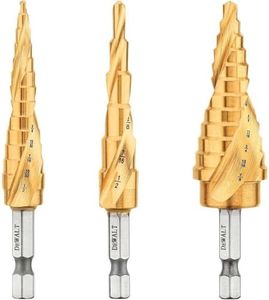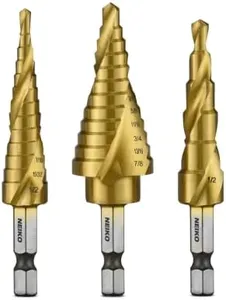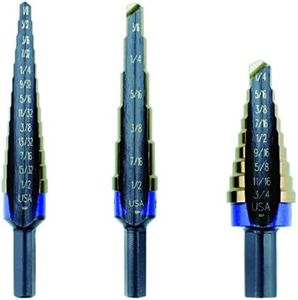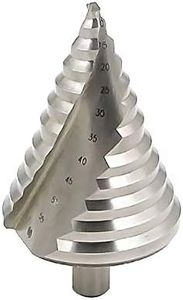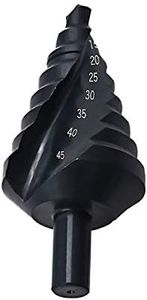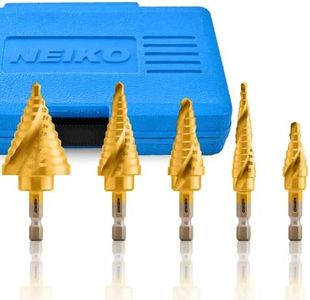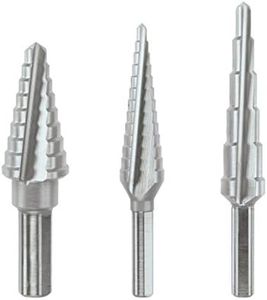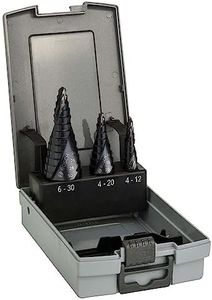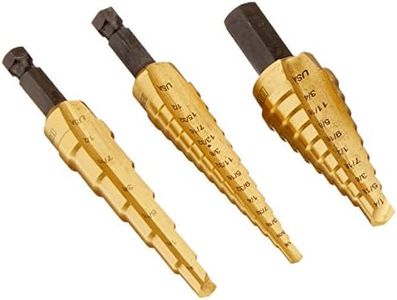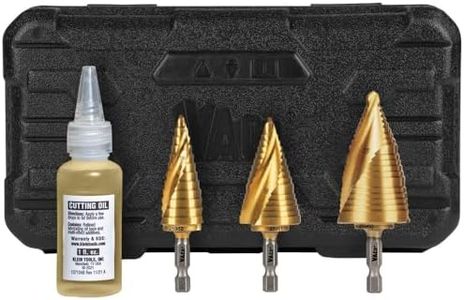We Use CookiesWe use cookies to enhance the security, performance,
functionality and for analytical and promotional activities. By continuing to browse this site you
are agreeing to our privacy policy
10 Best Step Drill Bits
From leading brands and best sellers available on the web.Buying Guide for the Best Step Drill Bits
Choosing the right step drill bit can make your drilling tasks much easier, especially when you need to create holes of various sizes in materials like metal, plastic, or wood. Step drill bits are unique because they have a conical shape with stepped levels, allowing you to drill holes of multiple diameters using a single bit. The goal is to match the features of the step drill bit to the type of work and materials you commonly encounter. If you focus on the right specifications, you’ll get better results and avoid unnecessary wear, breakage, or frustration.MaterialThe material of the step drill bit refers to what the bit itself is made from, commonly high-speed steel (HSS), cobalt alloys, or sometimes titanium-coated steel. This is important because it affects the durability and the types of materials you can drill. High-speed steel is versatile and affordable for general tasks and softer metals or plastics. Bits with a titanium coating last longer and are better for heavy-duty or professional use, as they resist heat and wear. Cobalt bits are best if you work mainly with tough materials like stainless steel, as they handle heat and abrasion better. Pick a material that matches the hardness and frequency of the tasks you’ll be doing.
Number of Steps/SizesThis refers to how many distinct hole sizes a single bit can drill, which is determined by the number of steps etched into the bit. More steps mean you can drill a wider range of hole sizes, which is handy for projects needing flexibility. Bits with fewer, larger steps will give you fewer hole size options but may cut faster through tough materials. Choose a bit with the step range that matches the hole diameters you need most often: if you frequently make several different-sized holes, a bit with many steps is more efficient.
Step IncrementsStep increment is the difference in diameter between each step on the bit. This affects how finely you can control the size of the hole. Smaller increments (such as 1mm or 1/16 inch) let you adjust the hole size more precisely, which is important for detailed or precise projects. Larger increments are better for when you only need a few common hole sizes or want to create openings quickly for rougher work. Consider what level of precision you need based on your typical projects.
Shank TypeThe shank is the part of the bit that is gripped by the drill. Step drill bits come with round or hexagonal shanks. Hex shanks offer a more secure grip, preventing slippage, and are compatible with quick-change chucks. Round shanks are traditional and fit most standard drills but can slip under heavy use. If you often change bits or work with tougher materials, a hex shank will be a practical choice.
CoatingCoating can refer to additional surface treatments like titanium nitride or black oxide, which increase durability and reduce friction and heat build-up. This helps the bit last longer and cut more efficiently. Titanium nitride coating is very popular for its hardness and long life. If you drill often or primarily work with metal, consider a coated bit to improve performance and longevity.
Overall Size and LengthThe size and length of the bit determine how deep you can drill and the range of hole sizes you can make. Shorter bits offer better control, especially for thin materials, while longer bits are useful for reaching through thicker workpieces. Assess the average thickness of the materials you usually work with, and choose a bit length that’s appropriate for those needs.
